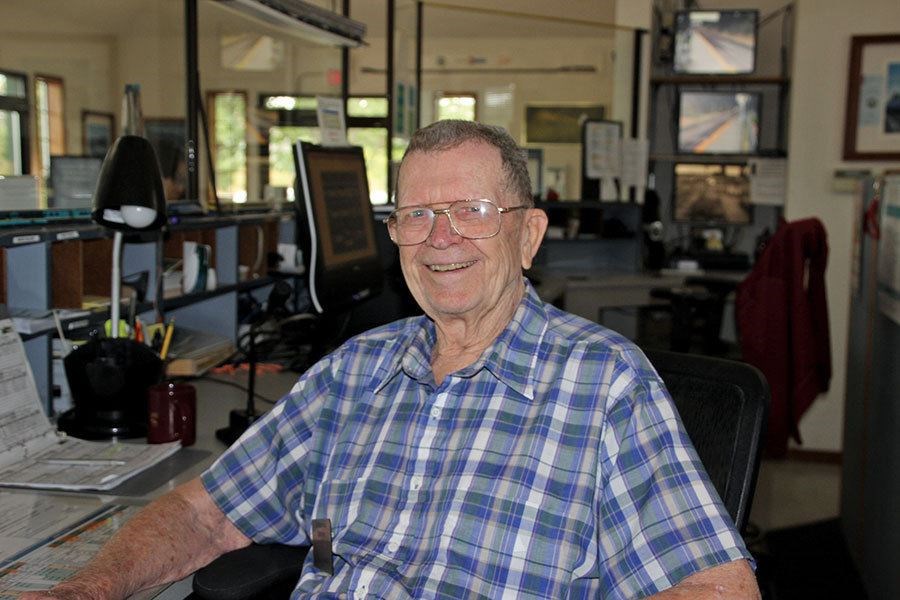Permission to use this
material was granted by
The Christian Science Monitor
Ken Lyons, in his 90s, has been one of the volunteers at Centennial Station in Washington State. He’s an example of how many seniors keep making a difference in their communities after their official retirement date.
LACEY, WASH.—Ken Lyons could have been a lot of other places.
 Ken Lyons has volunteered on Monday mornings at Centennial Station since 1992. This summer, he decided to step down from his role.(Gail Wood)But it’s been here, in a busy Amtrak train station, that Mr. Lyons has chosen to be, not home with his feet up and TV remote in hand. At 96 years young, he is still a doer, a goer by choice.
Ken Lyons has volunteered on Monday mornings at Centennial Station since 1992. This summer, he decided to step down from his role.(Gail Wood)But it’s been here, in a busy Amtrak train station, that Mr. Lyons has chosen to be, not home with his feet up and TV remote in hand. At 96 years young, he is still a doer, a goer by choice.
Every Monday from 8 a.m. to noon, Lyons has been behind the counter at Centennial Station just outside Lacey, Wash., answering questions and helping passengers waiting for the next train.
“It’s just something I love to do,” says the friendly Lyons, adding that this has given him a chance “to talk with people.”
It’s not a steady paycheck that has lured Lyons to drive across town to the station each week. He’s been one of 55 volunteers who have kept the station running.
It’s one of the few all-volunteer train stations in the United States. “There’d be no station there if there were no volunteers,” says Audrey Skaugseth, the station’s volunteer coordinator, who is herself a volunteer. “They keep it going.”
Many of the volunteers are well over 60 years old – Lyons being a case in point. He’s volunteered on Monday mornings since 1993, when Centennial Station opened.
This summer, Lyons decided to step down from his role. But that was after a very long ride, so to speak – 24 years of service. The help he’s lent is a prime example of how many seniors keep making a difference in their communities well after their official retirement date.
“You’ve just got to find something to replace your job when you retire,” says Lyons, who spoke with the Monitor before he stepped down at the station.
Centennial Station was itself built by volunteers, replacing an old depot nearby. It serves an area that includes Olympia, the capital of Washington State. Last year, about 65,000 passengers boarded or got off a train at the station.
Ten passenger trains pull into the depot every day: The first, a southbound train, arrives at 8:45 a.m., and the last, a northbound one, pulls in at 8:42 p.m. The volunteers have it all covered, with two of them serving at a time in four-hour shifts.
And if a train is ever late, be it midnight or 2 a.m., a volunteer is still there. It doesn’t matter whether the delay was due to bad weather, a breakdown of equipment, or something else.
The volunteers often have an important role to fill. “Over and over again I have people come up and say, ‘I’ve never traveled by train before. What do I do?’ ” says Lowell Dightman, who started volunteering about three years ago. “I see the job as helping people understand trains.”
Like Lyons, Dr. Dightman was looking for something to fill his schedule after retiring as a family doctor. Being around trains seemed like a perfect fit: As a child, he traveled from the state of Montana to Tacoma, Wash., via train, giving him a childhood memory of riding trains. And he hasn’t stopped taking them. “Actually, my wife and I prefer rail travel,” he says.
“Staying active is important,” Dightman notes. “When the time became available to help, I did that.”
As for Lyons, he was born in 1921 and grew up in Los Angeles. He remembers riding his bike down to the train station to watch the steam engines pull in. In the 1950s, he even got the chance to blow the whistle of a steam locomotive.
Lyons has spent a lifetime of doing. He was in the Navy during World War II, serving as a radio operator on a ship in the North Atlantic. After the war, he worked as a cabinetmaker, then reenlisted in the Navy. After earning his master’s in economics in 1959, he worked as an economist for a bank. In 1985, he retired from running his own hobby shop business. Amid all these things, he’s raced cars and boats, enjoyed jazz music, and painted oils and watercolors.
It was imperative that something replace his job. Volunteering at the train station was a natural fit. With his sense of humor and a list of jokes ready to share, he’s tried to give passengers an enjoyable encounter.
And of course, he’s always liked trains. “The only trouble I have with them,” he says, “is they don’t have steam coming out of them anymore.”
Permission to use this
material was granted by
The Christian Science Monitor
Page created on 11/27/2017 8:28:22 AM
Last edited 11/27/2017 8:44:08 AM
